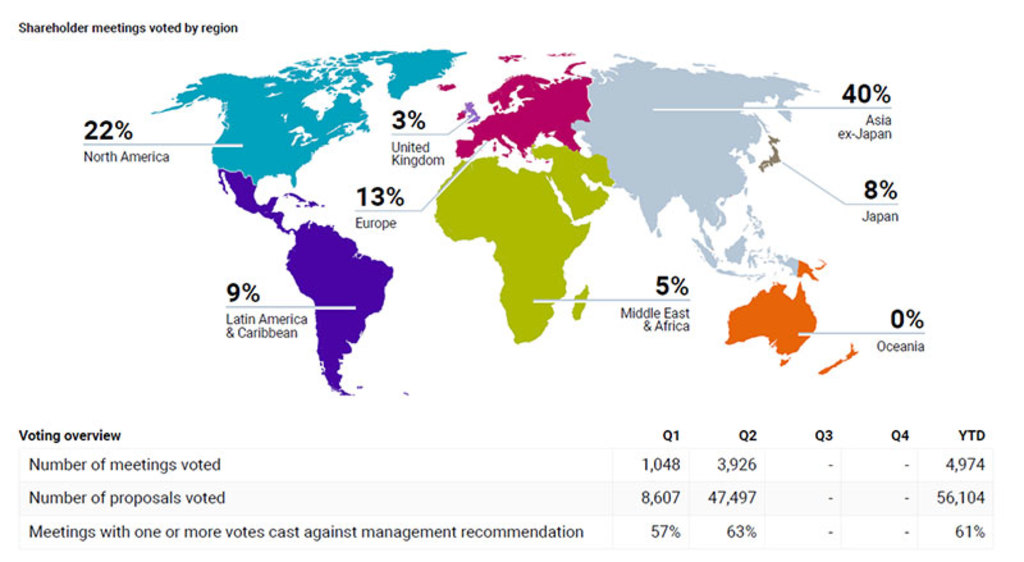

Voting report highlights divergence in views toward sustainability
The friction that can occur between investors seeking long-term sustainability and companies facing short-term challenges is highlighted in Robeco’s 2024 Proxy Voting report.
Summary
- Annual report details voting activity at almost 5,000 company AGMs
- Trying to strike a balance between long-term and short-term needs
- Case studies explain voting behavior on ESG issues at 24 listed firms
The annual report details how the Active Ownership team voted at nearly 5,000 annual general meetings (AGMs) on a vast range of issues concerning environmental, social and governance (ESG) topics. Of the 56,600 agenda items that were dealt with, at least one vote was cast against management 61% of the time.
Some of the flash points related to a perceived lack of progress on tackling climate change, or resolutions calling for specific targets related to emissions or net-zero commitments. Since these are long-term targets in the face of an uncertain future, it has sometimes created disagreement between shareholders and investee companies on how to deal with immediate short-term challenges.
Earlier in 2024, this dichotomy caused the oil giant ExxonMobil to file a lawsuit blocking a shareholder resolution calling for stricter climate targets. It led to fears that shareholder democracy was under threat, though most differences in vision between investors and companies are settled amicably, and many cases are routinely passed without comment.

Voting all over the world. Source: Robeco.
“Making use of our shareholder rights is an important part of our responsibility toward our clients,” says Michiel van Esch, Head of Voting at Robeco in the introduction to the report. “We actively engage with investee companies around key sustainability risks, impacts and opportunities, and as such we support them in building future-proof business models.”
“We believe that more sustainable corporate behavior results in an improved risk-return profile of our investments. Thus, on behalf of our clients, we use our engagement and voting rights to strengthen corporates’ awareness and approaches toward responsible business conduct.”
The 2024 report explains how voting situations played out under a wide selection of ESG topics, led by Say on Climate votes, in which Robeco voted against management 64% of the time. There are case studies about how ESG issues were dealt with at 24 companies in total, including the high profile ExxonMobil AGM. The vast majority of votes are not done in person, but by proxy.
No more rubber-stamping
“The days when all AGMs passed by quietly with approval rates in the high nineties are behind us,” Van Esch says. “The debates during the AGM season have increasingly become a reflection of issues in the economy and society at large. That also means that many AGM resolutions and the related topics under debate are complex; institutional investors might not agree with each other on a variety of topics, let alone with other stakeholders.”
“At the same time, companies are faced with conflicting messaging from their shareholders. On the one hand, there are shareholders who push for progress on sustainability topics such as biodiversity and human capital, but on the other hand there are also shareholders who are vocally pushing back on these trends.”
“Several larger companies are also openly more critical toward their shareholders. For the shareholder meetings that have been at the center of attention, the debate seems to be getting harsher and more polarized, which generally is not helpful in making progress.”
Reasons to remain optimistic
Yet, there is also plenty to be optimistic about, as companies largely agree that becoming more sustainable is in their own long-term interests. In the era of climate change along with post-Covid social changes, having an active dialogue is essential.
“In the vast majority of cases, the AGM offers the perfect opportunity to discuss progress on the company’s incentive structures, progress on sustainability targets, new nominations to the board and the management team, as well as capital allocation priorities,” Van Esch says.
“Therefore, we continue to actively use our voting rights, engage with investee companies around key environmental risks, impacts and opportunities, and support them in developing future-proof business models.”
Get the latest insights
Subscribe to our newsletter for investment updates and expert analysis.























